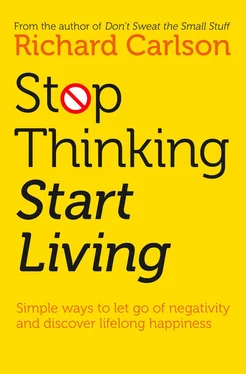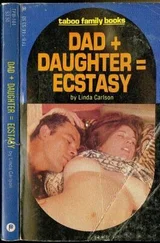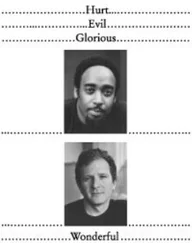One of the consistent problems I have seen in working with clients who have ‘given up’ on traditional therapy is that each time a new trauma is uncovered, the client is in effect starting over again. There are always new sessions designed to get to the bottom of each additional ‘issue’ and to explore the negative feelings that go along with recounting them. Each specific issue entails more negative feelings to explore. Many therapists insist that unless people deal head-on with their negative experiences and unconscious drives, they will be miserable forever. You must keep in mind, when deciding whether traditional therapy makes sense to you, that the therapists who tell you this are almost always paid by the hour!
In defence of therapists, I don’t think I’ve ever met one who would intentionally keep a client longer than they felt was absolutely necessary. Nevertheless, there is a certain conflict of interest to be very cautious of: if you get better, the therapist loses you as a client! If you have been in therapy for an extended period of time and are still unhappy, you may want to reconsider your treatment. Is more of the same really going to help? Is going deeper into your pain and suffering really going to help you experience joy? Is getting in touch with more negativity really going to make you feel less negative? I doubt it. History shows us that this route often doesn’t work.
Does this mean that therapy is useless? No. I would say, however, that success in therapy depends far more on the mental health and happiness of the therapist than it does on reliving past traumas and pain. A skilled therapist who is also a happy, vibrant person will most certainly be able to pass along at least some of her happiness almost regardless of the specific approach she uses.
One of the most striking observations that many people make when attending a Psychology of Mind seminar or when they have a private session with a consultant, is that the people who teach Psychology of Mind are very happy people themselves. I have come to believe that unless a person is happy himself, it’s very difficult, if not impossible, to teach someone else to be happy. How can an unhappy person, who is caught up in personal problems, teach an already unhappy person to feel joy? I feel grateful to be able to say that I am, indeed, a happy person, and I hope the feeling I bring to life will touch you as you read this book.
Who Is this Book for?
Carl Jung once said, ‘The greatest affliction affecting mankind isn’t serious mental illness – but the general uneasiness and unhappiness that is so prevalent in our society.’ Jung believed, as I do, that many people experience life in a ‘lifeless’ manner. Many if not most people have lost touch with the mystery and magic that surrounds us. The first step towards living fully is simply feeling better.
This book was written for anyone who would like to feel better than they presently do – anyone who frequently experiences ‘the blues’, ongoing sadness, a pessimistic outlook, frequent unhappiness, internal misery, a lack of gratitude about the gift of life – or someone who simply wishes to feel better . It is an outgrowth of an earlier book, You Can Be Happy No Matter What (New World Library, 1992). I received hundreds of letters and phone calls from readers who appreciated the principles of happiness that I spoke about, yet wanted to hear more specifically about how to get themselves out of the ‘lower states of mind’ that pessimistic people find themselves in.
The approach to happiness outlined in this book can help virtually anyone improve their mental outlook and the quality of their life. It should not , however, be used in lieu of professional treatment if you suffer from serious depression, suicidal urges or other serious mental illness. If you experience serious depression, please seek professional guidance before reading this book and attempting to implement the philosophy. Your doctor or counsellor may want you to use the ideas presented here in conjunction with your therapy. I certainly hope so, but please check first.
This book was written to address Jung’s assessment of the state of humankind, the general level of unhappiness that surrounds us. I will show you how to rid yourself of the negative feelings that can take over your life and replace them with the feelings of gratitude, happiness and love.
I will also show you how to access a place within yourself where ‘feeling good’ already exists, as well as how to detect those mental processes that take you away from this place. I have never met a person who didn’t feel better after learning this simple approach. Once you learn how you create unhappiness in your life with your own thinking – and once you learn how to stop this pattern – you will certainly be far more hesitant to continue or return to any destructive psychological tendencies you may have.
Approach the ideas here with an open mind and a curious heart. Don’t discount anything as being too simplistic until you have had an honest chance to practise what you learn and assess how you feel. If you read with your own common sense as your guide – remembering that your goal is to be happier – I believe you will be pleasantly surprised at how good you can feel. It really is true: you can feel good again.
One / Possibilities
Jim and Yvonne had been married for 32 mostly unhappy years when they discovered that Jim had a cancerous life-threatening tumour. Prior to discovering this information, the couple had lived together in an almost constant state of irritation. There was frequent conflict and anger, ongoing disputes and disagreement on virtually every issue surrounding their lives together. Their love for each other had been, in Jim’s words, ‘lost many years ago’.
A curious thing happened the moment they found out about the tumour. Both Jim and Yvonne experienced a sudden shift in their consciousness. The anger that had suffocated their love for so many years disappeared, their disagreements faded away and now seemed insignificant, and their love for one another resurfaced, almost magically, as though it had never left to begin with.
What happened? This couple experienced what is commonly referred to as ‘a change of heart’. No one knows exactly how or when this kind of sudden shift or change will occur, but we do know that they exist and that they are possible.
A sudden shift in consciousness can occur in any area of human life that has to do with how we feel, whether it be relationships, feeling anxious, feeling down, or any other immobilizing emotion. Consider an eight-year-old child who goes to bed every night frightened by the thought of an imagined monster behind the wardrobe door. Suddenly, one day, out of nowhere, she realizes that the monster isn’t real, that it exists only in her own mind. Interesting questions include: Why did the child have this realization on this particular day? What was it that made her realize the monster wasn’t real? The answers to these questions are surprisingly vague. We don’t know for sure, except to say that a new level of understanding surfaced within the consciousness of the child.
Another example of a sudden shift is the person who swears that he is going to stop smoking. Week after week, year after year, he promises he’s going to do it. You, as a friend, have heard the same story many times. Then, one day, for no apparent reason, your friend tells you the very same thing, only this time you know that he means it. Something is different. Something has changed. You can’t quite put your finger on it, but you know he will never smoke again. And indeed, he never does.
While the particulars of each sudden shift are unique, there are common denominators that seem to exist in all cases. First, the ‘shift’ itself doesn’t necessarily build on what we already know, but instead is seen suddenly , as if out of nowhere. In other words, the amount of information we have on the subject isn’t the critical factor. For example, I was working with a client, George, who had spent his entire life feeling prejudice about people of a specific race. He had a sudden shift in his perspective and realized (in his words), ‘What a fool I have been.’ What made this particular example so intriguing to me was that the two of us had never spoken about his prejudice. I never even knew he had this problem. His realization came about as he was discussing how his own thinking sometimes got in the way of his relationship with his wife. The shift that occurred in his consciousness was achieved without obtaining additional information about ‘the problem’. He had intellectually known for years that all prejudice stems from ignorance, yet he still felt prejudice, until that moment. Something shifted within him while he was thinking about something else.
Читать дальше












